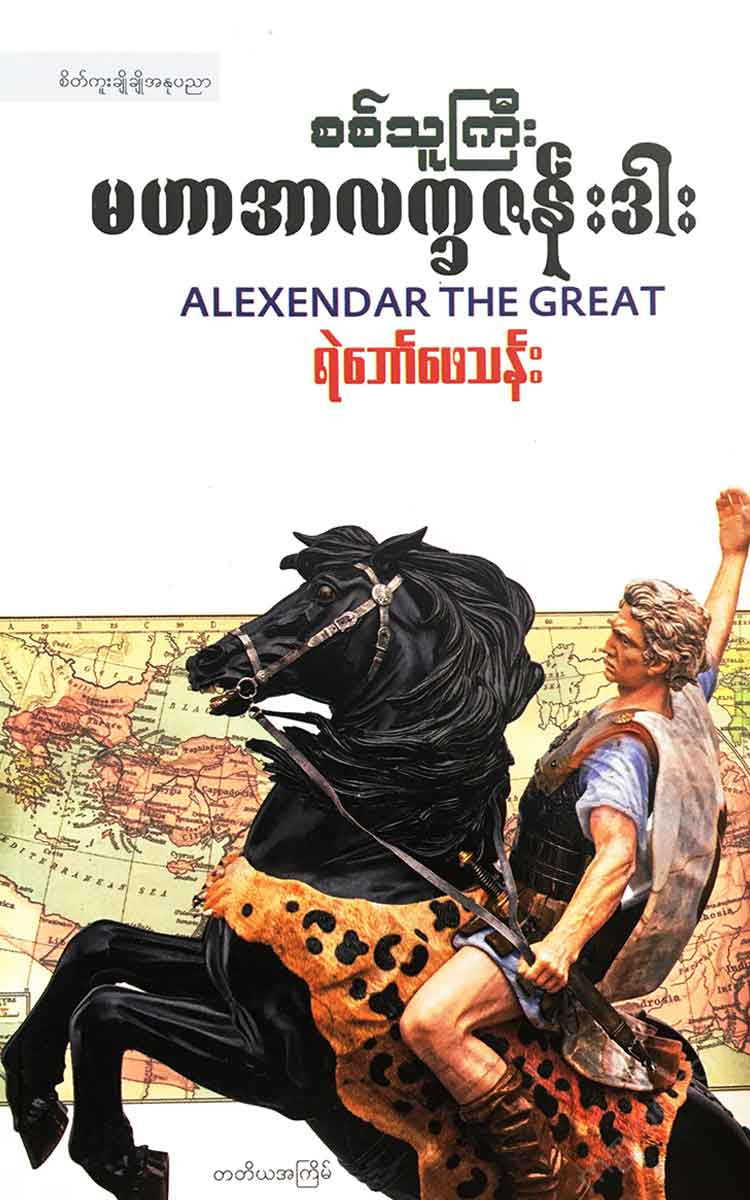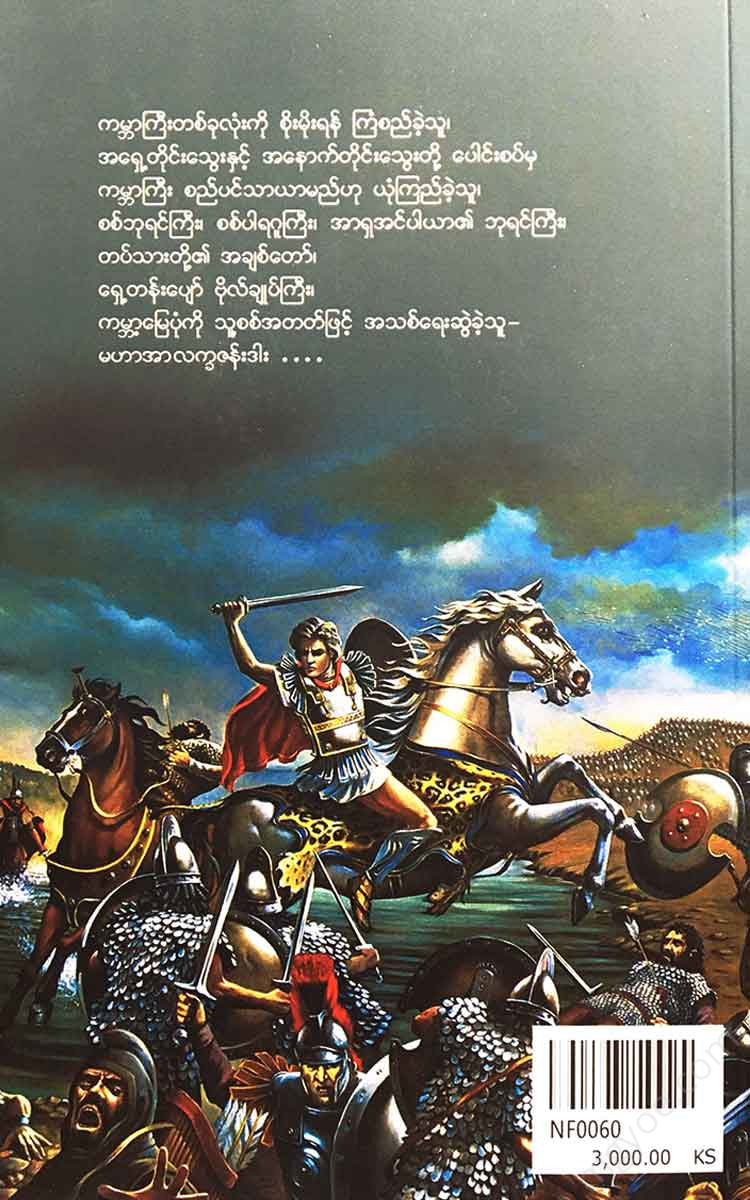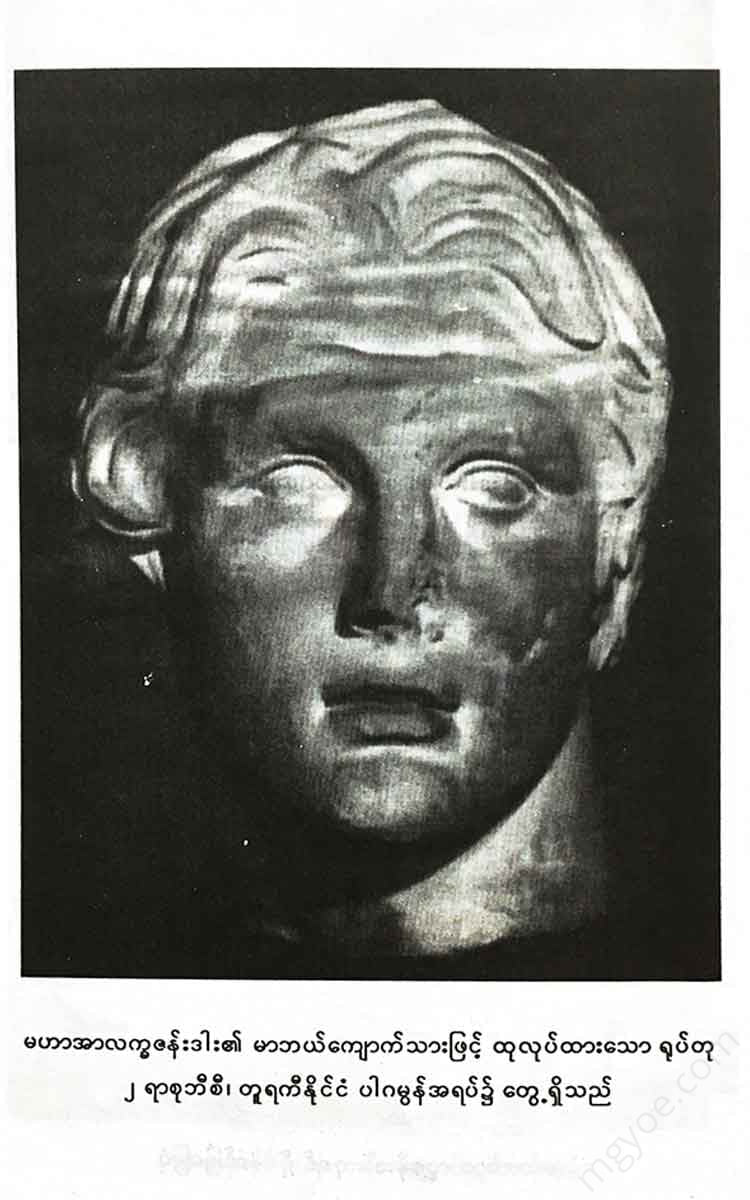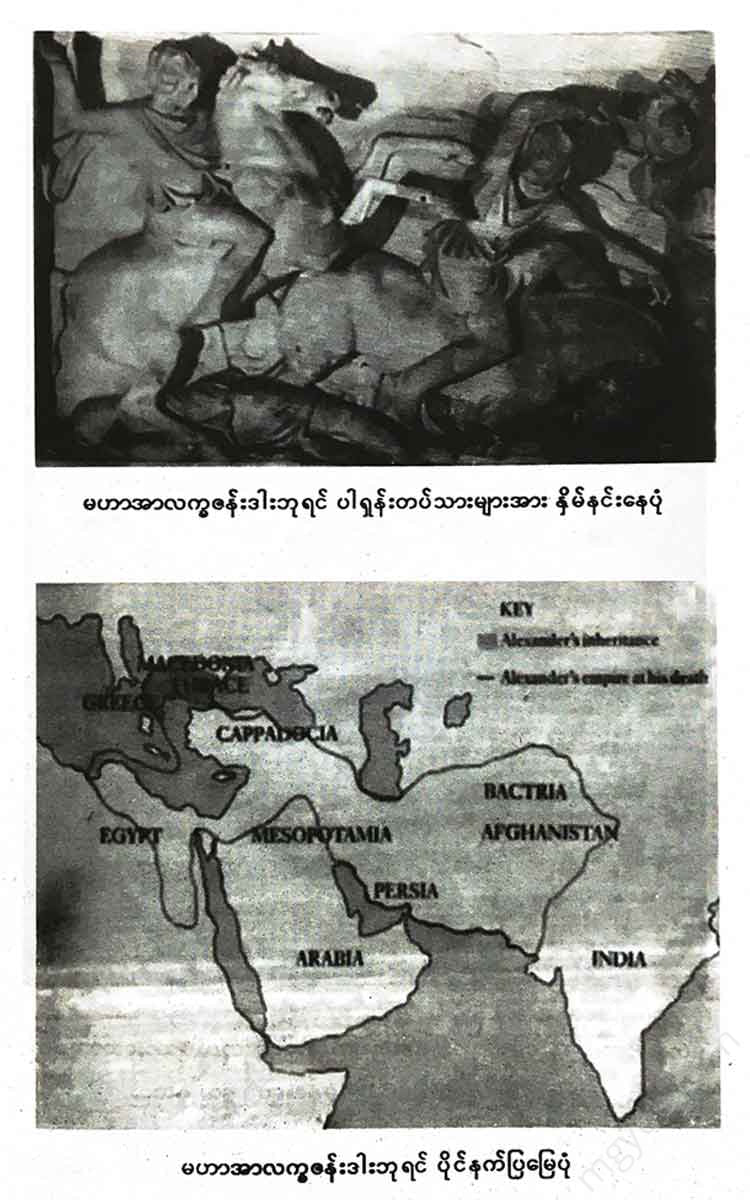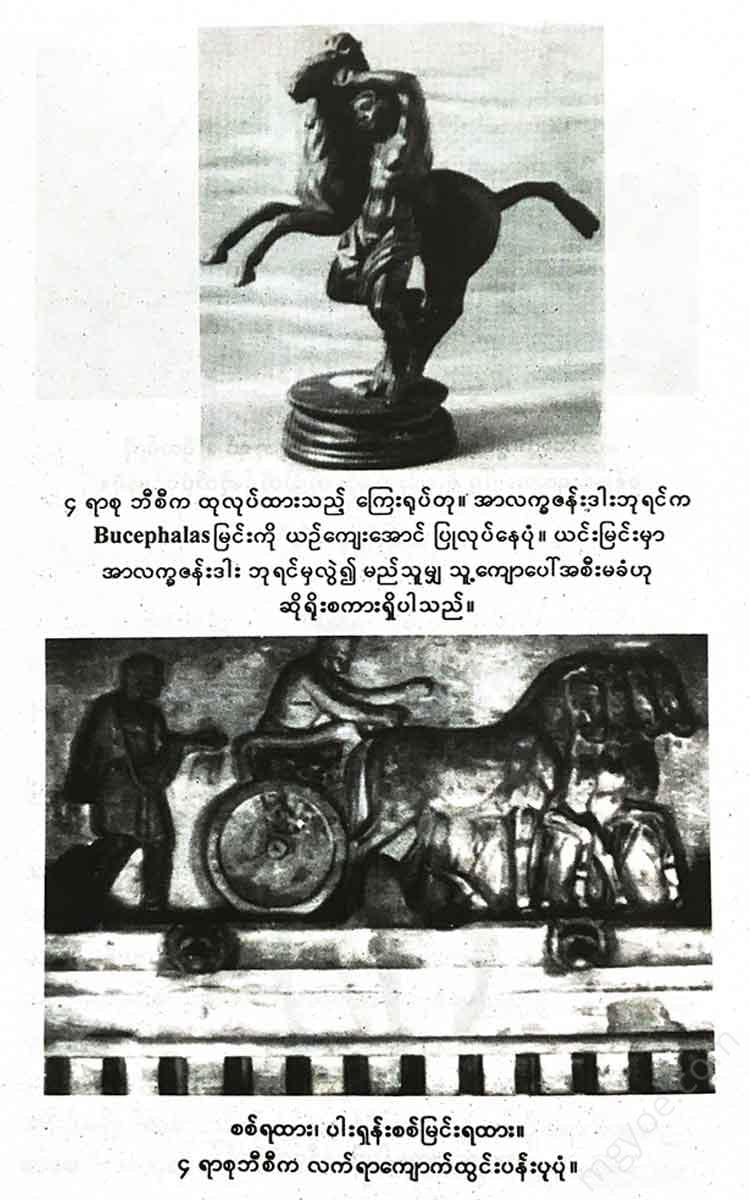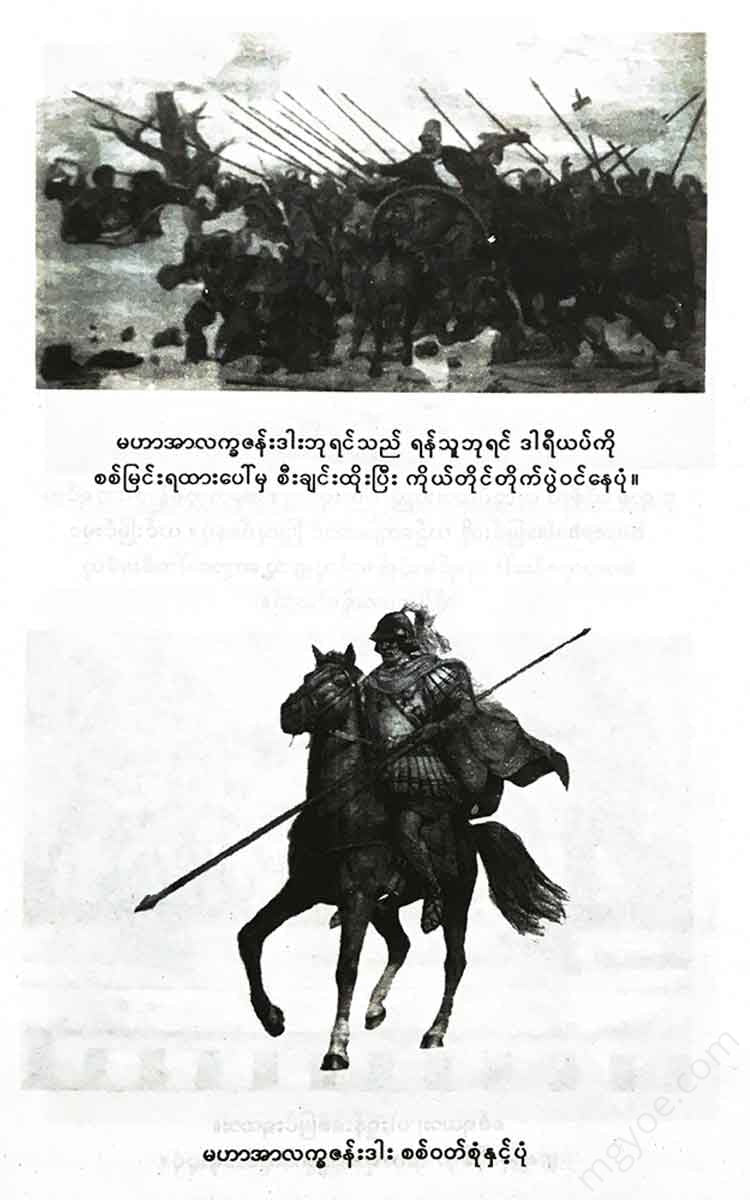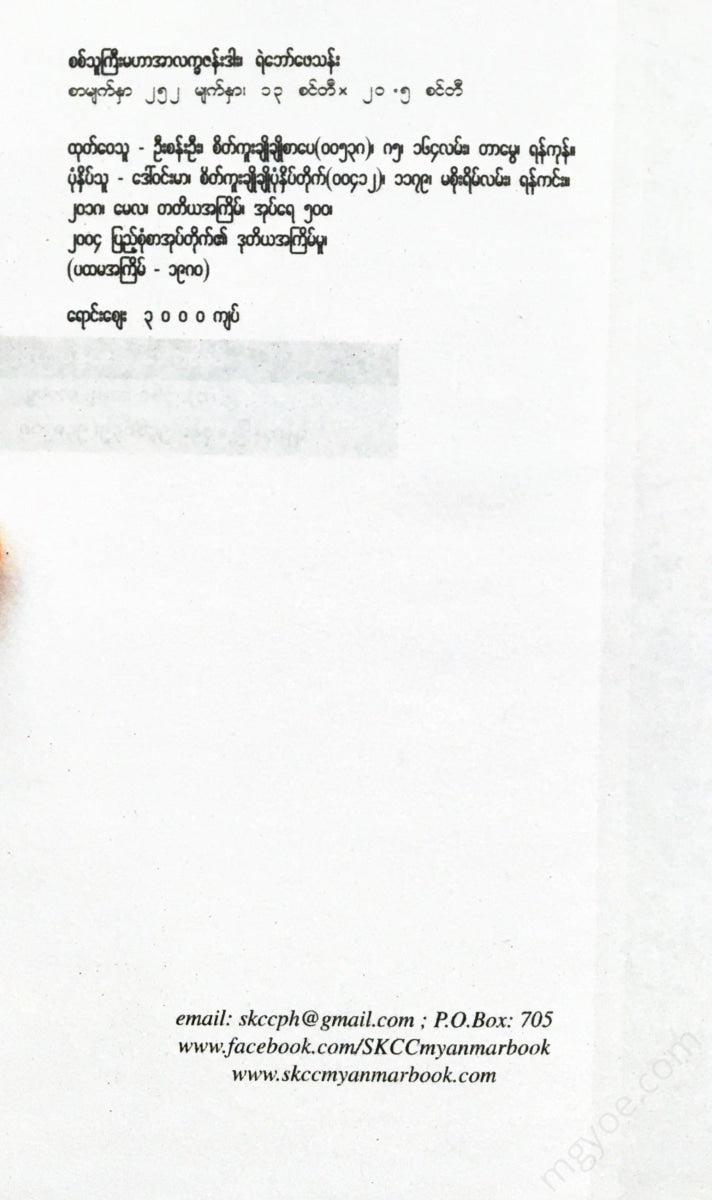စိတ်ကူးချိုချိုစာပေ
Comrade Pe Than - Commander Maha Alakhsanda
Comrade Pe Than - Commander Maha Alakhsanda
Couldn't load pickup availability
Chapter (1)
Parents and children
(356-340 BC)
Olympias, the queen consort of King Philip of Macedon, gave birth to a precious child in the city of Pella in the year of the 106th Olympic Games.
Christian historians estimate that year to be 356 BC.
The country of Macedonia is located in the northern part of the Greek peninsula, quite far from the Aegean Sea. The people who live there are a people of mixed blood of the Greeks, the Thessians and the Illyrians, and they live united under the military authority of a single king.
When the child was born, King Philip was not near Olympia. Philip was on the other side of Mount Olympus. Indeed, King Philip was a man who was only interested in military skill and delighted only in the battlefield.
Now, Philip is fighting on both sides of the civil war in the Sahara.
That year, King Philip received three pieces of good news in quick succession.
News that his general Parmenion had repelled the invading Illyrians who were trying to invade the plains.
The news that his queen Olympia had given birth to a precious child.
The news that his horse won the Olympic Games.
Philip was not often near Olympia. In fact, King Philip was always busy with his affairs. Only a few years before, the Illyrian mountaineers had invaded the plains, killing his predecessor Perdiccas and more than 4,000 Macedonian soldiers. The Illyrian mountaineers had no military ambitions. They came down to the Macedonian plains to plunder and kill the peasants.
After his death, his brother Philip ascended the throne.
Philip was a king of arms and heart. Fearless, eloquent. Intelligent. Able to endure hardships. He was patient. Because of these qualities, Philip was able to repel the invasion of the mountain people. That is why the farmers of the Macedonian plain loved and respected Philip. Philip was not arrogant. He treated his countrymen with kindness and only focused on expanding his territory abroad for the benefit of the country. His military interests were limited to foreign borders. For these reasons, the majority of the Macedonian peasantry, including Philip, considered Philip's wars of conquest to be just wars. They even considered them to be great military efforts for the country. Let us say that these were the relations between the king and the Macedonian people. Queen Olympias, however, did not see this in Philip and misunderstood him. In fact, Philip was having affairs under the pretext of military affairs. He was “inventing” military affairs for fun. Whenever Philip went to the front, he would take one or two of the most beautiful Macedonians with him. Some of them were even legally married. At that time, whenever King Philip said that he was going to war, Olympias would say that it was just for fun. Philip returned to the palace (or Nay Pyi Taw) and returned home.
Sometimes, I have the habit of loving my son and smiling at my wife.
But as is the custom of men who go out to war, as soon as the weather is good and they are comfortable, it is his nature to go out to war again. He hardly spends any time at home. King Philip is constantly guarding against foreign enemies. In the northwest, the mountain Illyrians are on one side, and in the east, the Therasians are on the other. Between these two enemies, the Paeonians are on the other. These enemies are always looking for the weakness of King Philip of Macedonia. It is customary for them to try to attack King Philip by making temporary alliances with each other. However, they are barbarian kings of a very low level of culture. They cannot even form temporary alliances with each other. Philip knew their weaknesses in advance. Philip had spent many years as a prisoner in the city-state of Thebes. Therefore, he was familiar with their customs and traditions. They had already planned to form an alliance. Thebes had already defeated Sparta. Therefore, Persia sent a large army to Thebes. Thebes was under their control. This experience taught Philip the art of espionage. When he heard that the barbarian kings were about to form a temporary alliance and imprison him, Philip used his archers to intimidate the Paeonian king into signing a separate peace treaty with him.
In this way, Philip was able to control his enemies in the east and northwest. This is probably why the great historians of Philip's time have lost sight of his activities during this period.
The firstborn in Olympia's womb was the future Alexander the Great, the warrior king who would later change the map of the world with his military prowess.
Alexander was raised under the tutelage of his mother. His father was often seen as a war veteran, with a haggard appearance and tattered clothes. Meanwhile, his father, Philip, was still blind in one eye. (When Alexander was three years old, Philip lost one eye while storming the Athenian fortress.) Alexander remembered his father calling his companions, big men with thick beards. Even though these men were naked and disheveled, they never took off their swords. When they were drunk, they would often use a sword or a club.
He remembers little of his relationship with his father in his youth. However, as Alexander grew older, he became as fond of drinking as his father. He developed the habit of drinking with his comrades. This friendship earned him the sympathy of his comrades in the wars of Asia. They faced the enemy with as much courage as they drank. Alexander and his comrade-in-arms were among the few who suffered as much injury as their leaders.
Indeed, Father Philip was a cultured man. The Macedonian kings were proud of having great blood in them. The Greeks were cultured. They were skilled in literature, poetry, and prose. The Macedonian kings, who were of great blood, were also skilled in poetry, poetry, and prose. They were well-versed in literature.
Olympia, though born in the royal palace and of pure royal blood, was superstitious. She was a member of the Lycian sect. She would dance naked under the full moon. She would dance with poisonous snakes wrapped around her arms and body. She followed these beliefs. She first met Philip at a festival on a mountaintop in the region. At that time, they were both young lovers.
Philip was probably in his 20s. He had not yet taken on any responsibilities, as a young man would have it. Time was running out, and when he was released from captivity in Thebes, his predecessor, the king, had also visited the beautiful island of "Khaber Roy" during his free time while ruling the kingdom.
Olympia, a young girl, left the palace where her father, the king, had bestowed her with the throne and came with her little brother to the mountaintop festival on the island of the fair maidens to celebrate the sacrifice.
Love begins in the eyes..
Young people meet, they meet, they fall in love.
Philip and Olympias were married in the same year that their predecessor, King Perdiccas, was killed in battle. Philip wanted to conquer a country that was difficult to conquer. He wanted a woman who was easy to control.
Olympia was a cruel woman. She was like a witch. She was as cruel in spirit as she was in appearance. Philip chose her and made her his queen. Philip was very fond of her. He always showered her with wealth. There was another reason. She was not only beautiful, but also of noble birth. Their family was the largest in the whole of Greece. Their tradition was not small. It was more profitable to be friends with them than enemies. If you were to marry such a great family, you could not take it lightly. You could not ignore it. Their parents and relatives had told Philip that he considered Olympia a son, a wife, and that he had treated her with the utmost respect and honor.
Philip loved Olympias. But he could not stay with his queen all year round. He was a king. A king had duties to perform. He had his own territory.
